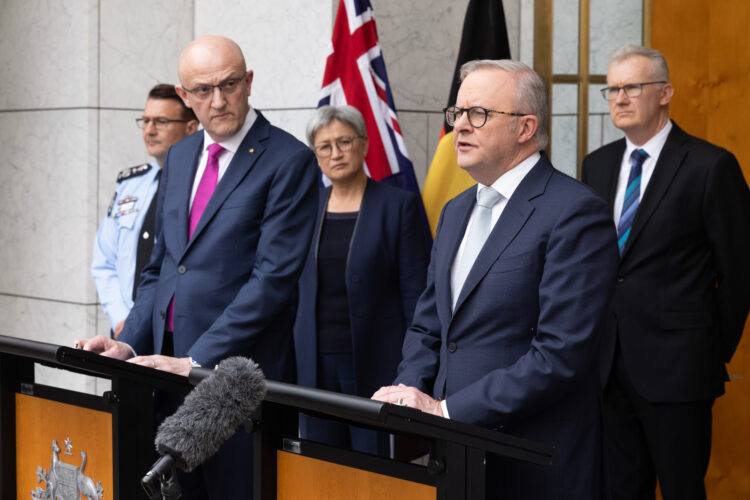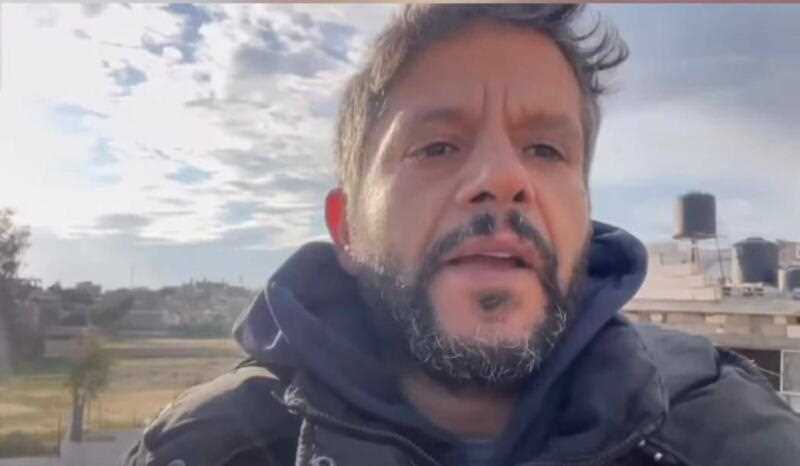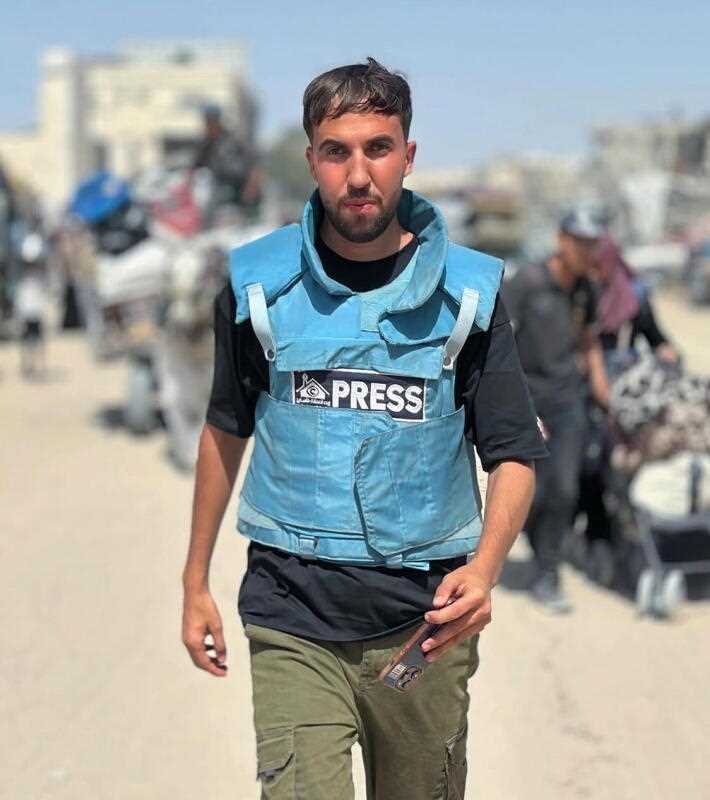It is party room meeting day today, which means the parliament won’t sit until midday. So the morning will be a bit of a flurry of activity (there are more interviews I will bring you soon) and then a bit of a ghost town as the party MPs go to their respective meetings. Then the message will come out that the meetings are done, the off-the-record briefings will be held, and then badda boom, badda bing, the parliament will sit.
Tue 26 Aug
Australia Institute Live: PM: Iran directed attacks in Australia. Ambassador expelled. As it happened.
This blog is now closed.

Key posts
The Day's News
Climate trigger? I don’t know her.
Q: Are you inclined to include a climate trigger? So effectively taking into account the impact of climate change in these environmental laws?
Murray Watt:
Look, we haven’t settled a position on that point yet. But what I would point out, Graham Samuel in his review did not recommend a climate trigger. He expressly ruled that out. What he recommended is companies when they’re putting forward projects for approval, should disclose their emissions and what their plans are to reduce their emissions going forward.
We’ve a range of other legislation and measures in place to require companies to reduce the emissions of their projects.
We’ve got our net zero targets, we’ve got the safeguards mechanism, that requires the largest emitting projects in Australia to reduce their greenhouse gas emissions by 5% every year and be net zero by 2050. So it’s not as if we’re not dealing with these issues, but the point Graham Samuel was making, there’s no need to duplicate them in the environmental laws as well as having the climate laws in place.
Sorry for the delay – the grief can be overwhelming at times.
In terms of domestic politics, Murray Watt is asked about what progress he has made on the environmental laws, in terms of getting all the different sectors on board (for reasons unclear to me, we still have to check in with people whose companies wreck the environment, to see if it is OK if they don’t wreck it quite as terribly)
Watt says:
I wouldn’t say we have reached a deal yet. But we’re certainly a lot closer than we were and have been for many years. (This isn’t exactly true, given that Plibersek DID make a deal to pass the legislation with the Greens. But the resources industry wasn’t happy, and the WA government wasn’t happy, so it was scraped)
Graham Samuel handed down his report to the then environment minister, Sussan Ley, calling the laws broken and pointing out they’re not working for the environment or for business, he handed that report down nearly five years.
It’s been 20 years since there’s been any significant environment law reforms. What we know is that we simply will not achieve our national priorities like building more homes, delivering more renewable energy, and of course protecting the environment, unless we see significant reform. So that’s why we have committed today to bring forward by several months the introduction of this legislation, we’ll be introducing it to the Parliament this side of Christmas, and we certainly will be seeking the support from both the coalition and the Greens to deliver these reforms.
There was a very clear consensus at last week’s economic roundtable we need to get moving on this reforms. The current laws are not working for business or the environment. We want to build more homes, we want to build more renewable energy, we want to not just protect but restore our natural environment, and the only way to do that is to get moving with the reforms.
Here is The New Daily report on Israel’s attack on a hospital, which killed at least 20 civilians, including five journalists. One of the journalists was live streaming events at the time (I will never unsee that footage suddenly cutting out as the missile struck, instantly killing Hussam al-Masri.) As other journalists and rescue workers rushed to help the wounded, a second missile struck, killing them as well.
Israel has come under widespread condemnation for a deadly double strike on a hospital in Gaza that Prime Minister Benjamin Netanyahu said was a “tragic mishap”.
Israel’s attack on Nasser Hospital killed 20 people, including five journalists who worked for major news organisations.
Netanyahu said in a statement Monday (local time) that Israel “deeply regrets” the mistake.
He said Israel “values the work of journalists, medical staff and all civilians,” and that the military was investigating.
Among the dead were five journalists who worked for Reuters, the Associated Press, Al Jazeera and others.
The Israeli military is refusing to provide a public explanation for the incident.
The UN secretary-general, along with the UK, France and others, condemned the attack.
The Foreign Press Association said it was “outraged and in shock”.
“This is among the deadliest Israeli attacks on journalists working for international media since the Gaza war began,” it said.
“These strikes hit the exterior staircase of the hospital where journalists frequently stationed themselves with their camera.”

A photojournalist with Reuters News Agency, Hussam Al-Masri, was killed. Photo: AAP
Cameraman Hussam al-Masri, a Reuters contractor, was killed near a live broadcasting position operated by Reuters on an upper floor just below the roof of the hospital in Khan Younis in an initial strike, according to Palestinian health officials.
Officials at the hospital and witnesses said Israel then struck the site a second time, killing other journalists, as well as rescue workers and medics, who had rushed to the scene to help.
The journalists killed included Mariam Abu Dagga, who freelanced for the Associated Press and other outlets, Mohammed Salama, who worked for Qatar-based broadcaster Al Jazeera, Moaz Abu Taha, a freelance journalist who worked with several news organisations, including occasionally contributing to Reuters, and Ahmed Abu Aziz.
Photographer Hatem Khaled, also a Reuters contractor, was wounded.

Among the casualties was NBC News Gaza correspondent Moaz Abu Taha. Photo: AAP
Israel’s military, the Israel Defence Forces, acknowledged striking the area of Nasser hospital.
The IDF “regrets any harm to uninvolved individuals and does not target journalists as such. The IDF acts to mitigate harm to uninvolved individuals as much as possible while maintaining the safety of IDF troops,” it said.
A Reuters spokesperson said in a statement: “We are devastated to learn that cameraman Hussam al-Masri, a contractor for Reuters, was killed this morning in Israeli strikes on Nasser hospital in Khan Younis in Gaza.
Moaz Abu Taha, a freelance journalist whose work had been occasionally published by Reuters, was also killed, and photographer Hatem Khaled, a Reuters contractor, was wounded.”
“We are urgently seeking more information and have asked authorities in Gaza and Israel to help us get urgent medical assistance for Hatem,” the spokesperson added.
The AP said it was “shocked and saddened” to learn of the deaths of Abu Dagga and other journalists, adding that Abu Dagga had often based herself at the hospital for coverage, which recently included stories on starving and malnourished children.
The Palestinian Journalists Syndicate condemned Israel for the strikes, saying it represented “an open war against free media, with the aim of terrorising journalists and preventing them from fulfilling their professional duty of exposing its crimes to the world”.
More than 240 Palestinian journalists have been killed by Israeli fire in Gaza since the war started on October 7, 2023, according to the Palestinian Journalists Syndicate.
Two weeks ago, Israel killed prominent Al Jazeera correspondent Anas Al-Sharif and four other journalists in a strike.
Israel has barred all foreign journalists from entering the Gaza Strip since the start of the war in 2023.
Reporting from the territory throughout the war has been produced by Palestinian journalists, many of whom have worked for many years for international media organisations, including wire services such as Reuters and the Associated Press.
-with AAP/AP
Q: Where do you think the Australian community sits on this issue at the moment? Are Australians at the point where they want to see greater action, maybe sanctions, if not against Israel, maybe against individual members of the Israeli government?
Murray Watt:
We of course have applied sanctions to some individuals within that government. But I do think the Australian community more than anything wants peace in the Middle East. They are not only sick and tired of seeing these sort of images on their TV screens, but they’re distressed by them, as they rightly should be, as human beings. We don’t want to see the continued loss of life with the continued intransigence from some of the parties involved and that’s why we’ve working with the international community to drive that peace, not just in the short term but in the long term.
More than 300,000 people across the nation marched with the explicit call for sanctions against Israel and for Australia to stop sending weapons parts.
Q: The Israeli Prime Minister Benjamin Netanyahu has called this a tragic mishap, they’re his words. Will the Albanese government do anything apart from using words to condemn it. Will you take more concrete steps to send a message to Israel? (This is textbook by the way – Israel has a long habit of calling war crimes ‘accidents’.)
Murray Watt:
This is not the first time we’ve seen Netanyahu apologise or accept what he calls innocent mistakes or mishaps. Every time something like this happens, it costs people’s lives. It’s not acceptable. What we’ll do is continue to work with the rest of the international community to demand a ceasefire, to demand hostages be released, and to demand peace in the Middle East and that requires some change from Mr Netanyahu.
Murray Watt ‘utterly condemns’ Israel’s latest war crime
Murray Watt is speaking to ABC News Breakfast, where he is first asked about Israel’s double strike on a Gaza hospital which has killed at least 20 civilians, including another five journalists.
That is a compounding of war crimes. I remember when Israel first started attacking hospitals and denying it (despite the evidence Palestinians were showing us) and politicians and news editors wanting to ‘wait for more evidence’. For a while, Israel pretended the hospitals were Hamas headquarters. And then Israel launched attacks against every hospital and make shift hospital in Gaza, shutting down most of the health system, kidnapping doctors, killing health care workers – and it all became so normalised. It should NEVER be normal. What is happening in Gaza is genocide, and there is no way that should ever be considered normalised.
Watt is asked about the latest war crime (my language, obviously) and says:
We utterly condemn this action and it’s yet another outrage in a war that’s gone on too long and cost too many innocent lives. It’s very clear that targeting or hitting hospitals, health workers and civilians is a breach of international law.
We join with the rest of the international community in condemning this action.
We can’t speak for Israel’s intent in this, but it appears to be a clear breach of international law and these sort of incidents have got to stop as we find a ceasefire and peace in the Middle East.
Massive round of a applause for the Albanese government spinners who have media outlets reporting that Murray Watt will be ‘fast tracking’ environmental laws which were floated by the Labor opposition during covid, shut down when an agreement had been reached between Tanya Plibersek and Sarah Hanson-Young, shelved by Anthony Albanese and now three and a bit years after taking power, will be re-introduced into the parliament before the year ends. What. A. Fast. Track,
That’s like me saying I am ‘fast tracking’ the diet I committed to in 2021 in 2025. Brilliant. Snaps all round for the government comms team.
Apparently it is ‘fast tracked’ because the re-introduction is coming before the end of the year (the last parliament sitting is in November, but the reports all say before December) which is earlier than the allegedly planned re-introduction date of June next year.
Hokay. Sure.
A reminder that the government had a deal, but it was with the Greens, which Tanya Plibersek wasn’t supposed to negotiate, but did, which then made the WA Labor government have an absolute tantrum, because it would apply to some of their resource projects, which they didn’t want. Can’t have that pesky environmental trigger actually triggering when the environment is at risk! So Anthony Albanese came in over the top and scrapped the whole thing. But now we are pretending this is all being fast tracked. Brilliant, five stars, no notes.
In case you were wondering where Richard Marles is – I know that personally, it consumes my every waking hour – he has just arrived in the US. He’ll be having ALL the Aukus meetings with the Trump administration and US defence hawks, where he’ll be asked lots of fun things like, ‘what would you do with these submarines that we have already agreed to sell you but don’t think you should control on your own, and in fact think we should have agency over, despite your ‘ownership’ of them’.
Australia has sent at least $1.6bn to the states to help with its own ship building, the idea being that if the US can meet its own capability needs, it will get around to ours. But fun fact; the US don’t have to give us the submarines, or the money back, if it decides it doesn’t want to! And increasingly, the Trump administration is saying all the quiet bits out loud, including that the US wants to be able to deploy the Australian subs in the event the US decides to go to war with China.
Fun! Lucky we have Richard Marles though.
Skills minister Andrew Giles is at the press club today. As AAP reports:
Australians have been urged to value vocational training the same as university degrees in the face of a massive skills shortfall.
The challenge will be thrown down by Skills Minister Andrew Giles in a speech at the National Press Club on Tuesday, where he will also unveil a $30 million boost to grow the number of vocational teachers.
The money will be used to increase the number of electrical and construction teachers as well as those from Indigenous backgrounds.
Mr Giles will also use the speech to call for vocational education and training to be equally valued as universities for career opportunities.
“I am concerned that in Australia we don’t have … parity of esteem between the tertiary pathways,” Mr Giles will say.
“Right now, we aren’t on track to match qualifications to job requirements. We need to change this.”
He will say nine out of 10 new jobs are expected to require some form of tertiary education, with half of those from VET courses and the other half from university.
Vocational training cannot be treated as a “plan B” option by society, Mr Giles will argue.
“VET is a key driver of national productivity and of individual opportunity,” he says.
For every new qualified tradie, an additional 2.4 houses can be built each year, according to research from Master Builders Australia.
Mr Giles says Australia will only achieve the national goal of four in five Australians holding a TAFE qualification or a university degree if the “artificial barrier” between vocational and higher education is broken down.
He says the nation must also ensure migrants are recognised for their skills through effective regulation and enforcement.
“Too many have been held back from making their contributions to this country,” he will say.
Fee-free TAFE has resulted in more than 650,000 enrolments across the country, with 170,000 of those courses already completed.
Job seekers and people living with disability comprised 200,000 enrolments while more than six in 10 are women.